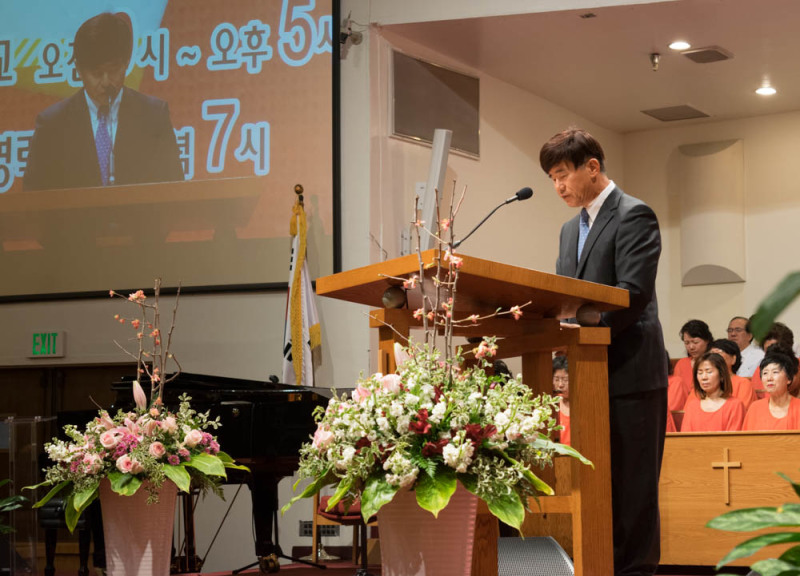
Rev. Sam Shin worked in law enforcement as a narcotics and SWAT police officer in Alaska, and then as an undercover cop with Korean gangs in Los Angeles. He got involved too deeply as a gang leader and was sentenced to jail time. After a dramatic conversion in jail, Shin dedicated his life to being a pastor. Now he leads his own church supports nearly 1,400 pastors as the first English-speaking president of the Southern California Korean Ministers Association.
"It could be one of those true story movies, but I don't have the money to make one," Shin laughed.
Shin's combination of Korean and American upbringing make him part of the so-called "1.5 generation" of immigrants who are able to bridge language and cultural chasms between first generation Koreans and the rest of society. Shin used his unique experiences and skills both in law enforcement and as a pastor.
"The 1.5 generation that can bridge the gap are getting older. People like Sam are kind of like a rare, endangered species," said Jay Park, a Korean-American Christian and longtime friend of Shin's.
Shin's dual clerical training and law enforcement background were apparent at the Koreatown Homeless Count, part of a joint city and county effort to tally the number of people who live in the streets. Before the count started, he led prayer, carried boxes of potato chips to set up dinner and translated instructions for Korean volunteers.
Shin, 60, has an average stature, but an outsized, charismatic presence. He is classically good-looking with thick black hair. He flashes his straight-toothed smile every chance he gets, and rarely answers a question without cracking a joke first.
But when the count started on a chilly January night, Shin turned all business. He expertly scanned every nook and cranny of parking lots, abandoned cars and staircases. Once the team finished counting, he to pick up sleeping bags from his church. Shin returned to a couple of homeless people and offered them prayer and a sleeping bag.
"Don't tell anyone about this. We aren't supposed to be doing this," Shin whispered conspiratorially.
Shin's tendency to act on what he thinks is just, regardless of the rules, has been a pattern through his past.
When Shin moved from South Korea to Alaska with his parents as a young boy for his stepfather's banking job, he was bullied because he didn't speak English. There were hardly any other Koreans in the area. Shin said his desire to be a police officer was partly driven by a desire to serve and partly, he admits, by resentment.
"I wanted to be better than them," Shin said. "I wanted to have control of them because they were controlling me."
Shin worked as a narcotics and SWAT officer in Anchorage, Alaska, and then decided to take a job as a Korean-speaking officer in Orange County in 1988, just four years before riots engulfed Los Angeles in racially charged conflict after four police officers who beat an African-American man, Rodney King, were acquitted.
In the aftermath, Shin said he started doing undercover work for the federal government in Korean gangs. Shin said he rose in the gang ranks and became a kingpin. However, he got too deeply involved and went to jail on a civil judgment related to charges of theft and leaving a hospitality establishment without paying. Shin said the incident occurred when his gang intervened to retrieve allegedly stolen property from a man in the United States after the man was involved in a messy divorce in Korea.
"Legally I would do things with undercover work, and I thought I was God," Shin said. "I had so many youngsters who were my workers in the gangs, and I was the top of the line."
In jail, a group of around 20 Christians huddled in a corner to sing praise songs and have Bible study each evening before bedtime. Shin said he didn't understand how "good Christians" could be sentenced to jail for serious offenses, so the meetings infuriated him. Shin tried to make the worshipers' lives miserable by kicking them, hitting them and spitting on their food.
One day in November 1996, two worshipers cautiously approached Shin asked to pray for him. One told Shin that God had a plan for his life. The tough, macho gang leader broke down in tears and ducked under blankets to hide his sobs.
"As a police officer I committed crimes. As a person I committed crimes. I was repenting," Shin said.
Shin asked a friend to send him a Bible in jail. That same tattered, threadbare English-Korean Bible sits on his desk today. Despite hardly knowing anything about Christianity, Shin started attending worship in jail and leading Bible studies.
Jay Park is an attorney who has been friends with Shin for more than 30 years. Park and Shin struck up an unlikely friendship when Shin asked for legal advice during his time as a police officer. Park, a Christian himself, said he was glad to hear of Shin's sudden turnaround.
"I believe that he has completely changed," Park sad. "He has proved the change through his actions."
Shin went to 13 years of seminary in both English and Korean, after which he said most people were convinced of his transformation. He began working for a large nondenominational church in Koreatown, and then moved to South Korea in 2010 to be a senior pastor.
"My heart was willing to go to church and use a toothbrush to clean the whole floor if I had to...I was so indebted as a sinner," Shin said.
However, when his mother got sick and died in 2013, Shin returned to California to be with his family. He said he didn't want to be involved in ministry anymore.
That is, until a few families persuaded Shin to start Only Jesus Mission Church, a small multicultural church that he has now co-led with a Spanish-speaking pastor for four years. The church is tucked into a nondescript strip mall in Koreatown and offers services in English, Korean and Spanish.
"I wish I spoke Chinese and Japanese too," Shin said. "I want to have that kind of church."
When the Korean Ministers Association tapped Shin to be senior vice president and then president, he was reluctant to accept. He was busy with his own church and said he didn't see himself fitting into the group because he wasn't a first-generation immigrant like they were.
After reflection, Shin said he recognized that he was uniquely positioned to connect the association with outside groups, so he took on the volunteer position.
Rev. Joo Suh Uhm was the association president who recruited Shin. Uhm had previously worked with Shin at Wilshire Christian Church, and said he saw Shin's potential to overcome language and cultural barriers between first- and second-generation Koreans and the outside world.
As part of his efforts to connect the association with other ethnic religious groups, Shin spearheaded a multicultural revival between Hispanic and Korean communities this spring. Uhm said before Shin, the association "couldn't have dreamed" of doing a large intercultural outreach event.
Shin represented the ministers association at a Korean missions conference at Young Nak Presbyterian Church in February. He busily darted around greeting the choir, taking a photo with prominent pastors at a VIP reception, and filing into the sanctuary for a brief time of worship. Shin approached the pulpit and took his brown, plastic-framed glasses off to welcome a crowd of 400 attendees.
Though the conference was solely in Korean, Shin prayed in both English and Korean, weaving together divine appeals that could reach every soul in the crowd.

















